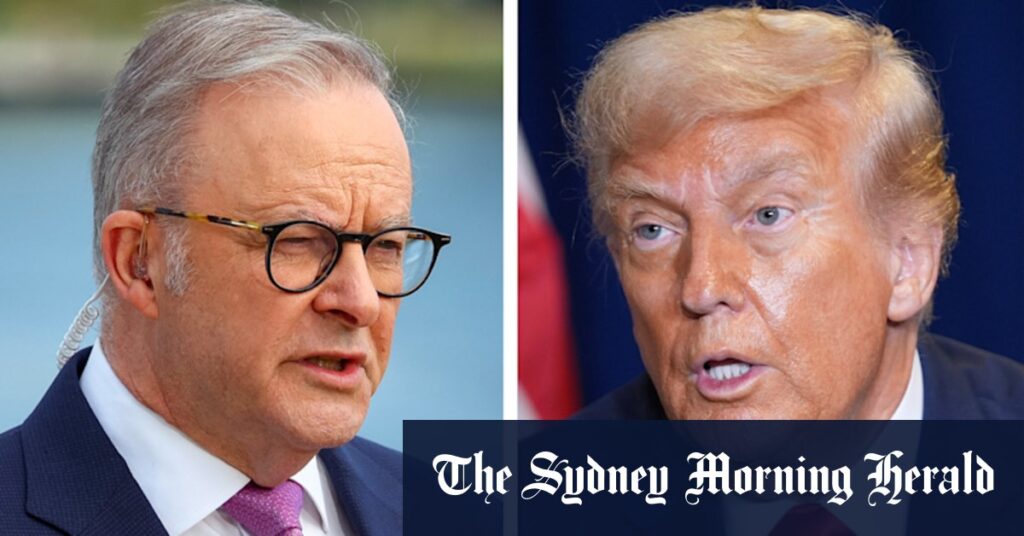
Australia is preparing to defy the Trump administration’s threats of punitive measures against nations supporting a global carbon pricing pact for international shipping. This move sets the stage for a potential diplomatic clash with the United States, just days before Prime Minister Anthony Albanese is scheduled to meet with former President Donald Trump on October 20.
The decision comes after the U.S. declared its opposition to what it terms a “global carbon tax,” warning of sanctions, visa restrictions, and port levies against allies endorsing the initiative. Despite these threats, sources indicate that Australia is likely to support the scheme during a vote at the International Maritime Organisation (IMO) meeting in London on Thursday, Australian time.
The Australian government has not publicly disclosed its stance, reflecting the delicate balance it must maintain between pursuing ambitious climate goals and managing its relationship with the U.S., which remains skeptical of green energy initiatives. The proposed scheme, known as shipping’s net zero framework, is a cap-and-trade system designed to penalize companies whose ships exceed emissions limits while rewarding those that achieve reductions.
International Support and Domestic Challenges
The carbon pricing scheme is expected to garner backing from key members of the Paris Agreement, including the European Union, Japan, China, and Pacific nations. However, the timing of the vote presents a challenge for Prime Minister Albanese, who is seeking to negotiate relief from U.S. tariffs on Australian exports such as steel and aluminum during his upcoming meeting with Trump.
U.S. officials are reportedly working to introduce an amendment that would require large shipping nations to ratify the scheme domestically, effectively granting them a veto. Australia is not expected to support this amendment, having already signaled its approval of the draft scheme at the IMO in April.
“President Trump has made it clear that the United States will not accept any international environmental agreement that unduly or unfairly burdens the United States or harms the interests of the American people,” stated U.S. Secretary of State Marco Rubio.
Economic and Political Implications
The Trump administration argues that the carbon pricing scheme could increase shipping costs by approximately 10%, impacting consumer prices for imported goods. Rubio has warned of potential tariffs and other measures against nations supporting the initiative, which he described as an “activist-driven climate policy.”
Australian officials have been deliberating their response to the U.S. stance, amid speculation that abstaining from the vote could appease Trump. However, withdrawing support could strain relations with allies and undermine Australia’s efforts to boost local manufacturing through clean technology.
Opposition transport spokesperson Bridget McKenzie criticized the government’s position, arguing that the carbon tax would disproportionately affect importing nations like Australia. “Labor should have vigorously opposed this tax,” she said. “Instead, it’s another example of Labor signing us up in secret to an international agreement without explaining the costs to the Australian people.”
Australia’s Broader Climate Strategy
The Australian government is committed to transitioning to a net zero economy, as evidenced by its $23 billion Future Made in Australia fund, which supports clean industries like green steel and aluminum. Additionally, a $1 billion green fuel strategy aims to commercialize renewable diesel and other low-emission technologies.
Australia is also vying with Turkey to host the United Nations’ annual climate summit, COP26. Climate Change Minister Chris Bowen is reportedly considering a shared hosting arrangement with Turkey, following President Recep Tayyip Erdoğan’s refusal to withdraw his nation’s bid.
Professor Michael Brear of the University of Melbourne highlighted the significance of the IMO vote: “The Albanese government unequivocally should support the vote [at the IMO]. It would be a major step towards net zero for international shipping to become the first internationally traded carbon scheme.”
Looking Ahead
The outcome of the IMO vote and the subsequent meeting between Albanese and Trump will be pivotal in shaping Australia’s climate policy and international relations. As the nation navigates these complex dynamics, it remains committed to demonstrating its climate change leadership on the global stage.






